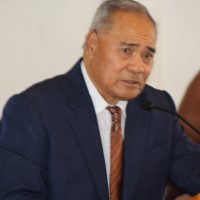
Former Governor Lolo Letalu Moliga is urging Congresswoman Uifaatali Amata to do all she can to prevent deep-sea mining in waters in, and around, American Samoa.
A May 26 letter that Lolo sent the Congresswoman thanked her for her efforts in championing American Samoa’s quest to safeguard the tuna canning industry by opening up fishing grounds banned by federally established marine sanctuaries.
He said this has been a protracted and very arduous battle and, “Our people are truly fortunate to have a person of your caliber, passion, dedication and unwavering commitment to safeguarding and advancing their social and economic interests.”
But he said we have to wage “another grueling battle” to protect and preserve our marine resources against deep sea mining. “I pray that you will again lead our charge to ward off money grabbing enterprises at the peril of our people,” he urged the Congresswoman.
Lolo referenced his May 1 letter to Governor Pulaalii Nikolao Pula, in which he made known his vehement opposition against deep sea mining “for the obvious consequential obliteration of our marine environment and marine resources that we historically and presently depend on for our economic and subsistence livelihood.”
The former governor pointed out that safeguarding and sustaining American Samoa’s unique culture and way of life is categorically tied to the protection of its marine resources and its environment.
He said the United States accorded American Samoa the legal privilege to assess and decide federal laws to be applicable to American Samoa. For example, we handle our own immigration, customs, taxes and border issues “which exemplified special autonomy granted by the United States to American Samoa.” But, he noted, “Capriciously, authorizing seabed mining within or just outside American Samoa’s 200 mile economic zone without first seeking the wishes, opinions, and feeling of the people defies the spirit of autonomy” given to the territory.”
Governor Pulaalii Nikolao Pula had said in a statement that the seabed mining proposal may be an avenue for the territory to diversify its economy, but one that must be thoroughly investigated and explored to ensure there are no threats to marine resources.
In his letter to Congresswoman Uifaatali, Lolo said the use of the long acknowledged “finiteness of our economic development options as rhetoric to justify the perceived necessity for seabed mining, without first quantifying the benefits and comprehensively assessing resulting consequences, constitutes a very perilous path to pursue.”
He told the Congresswoman, protecting our oceans, our marine resources, and our environment reflects sacred trusts that should not be sacrificed and weighed against economic and financial considerations. “Unilaterally, making decision on activities that would undeniably hurt American Samoa does not reflect the honored and treasured spirit of democracy.” Lolo concluded, “It is my fervent hope that you will champion our cause to discourage the declared promotion of conducting seabed mining in our backyard.”




